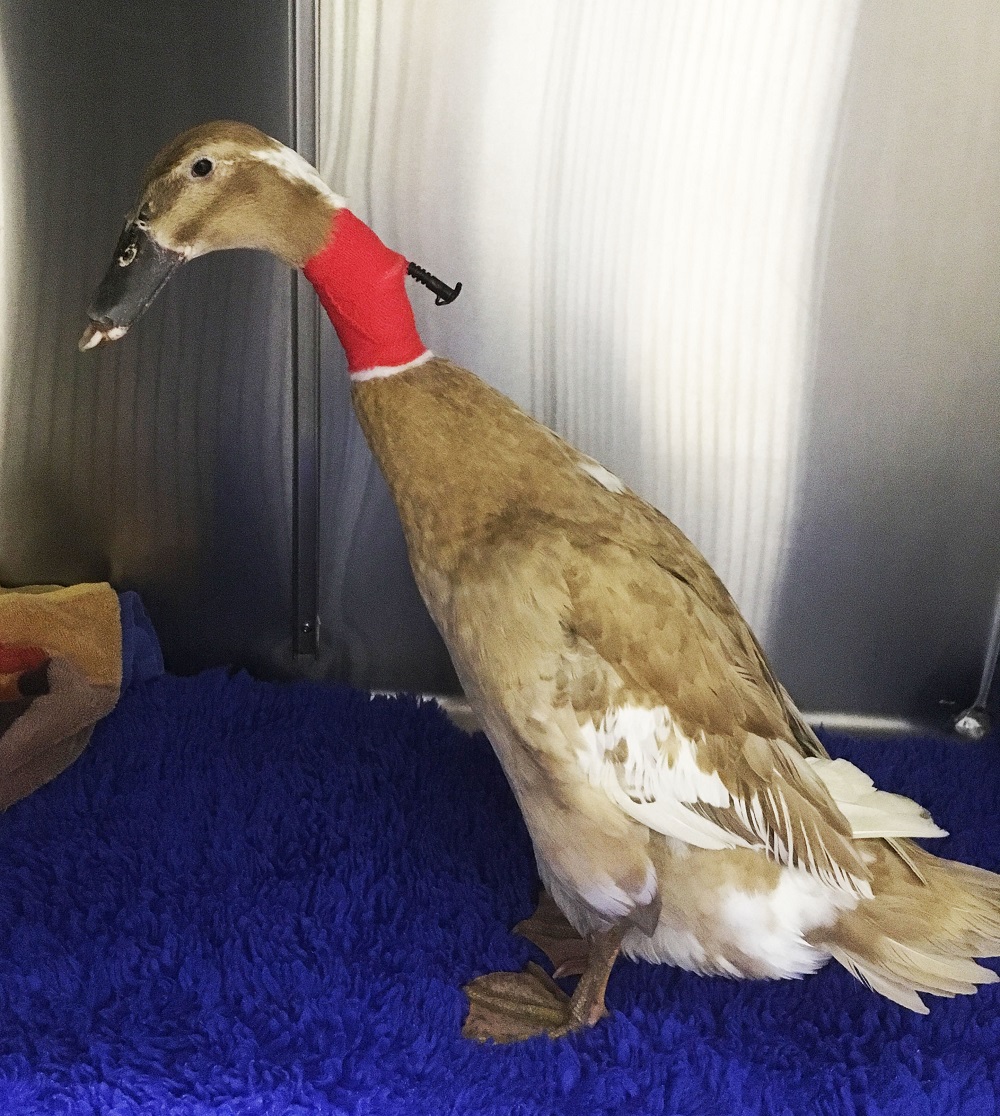Duck Intensive Care Case
Clinical Connections – Autumn 2018
A recent case seen by the Exotic referral service at the Beaumont Sainsbury Animal Hospital demonstrated how important intensive nursing care is for our more unusual patients.
Squeak, a four-year-old female Indian runner duck, was referred to the exotics team at the Beaumont Sainsbury Animal Hospital (BSAH) for treatment of a fractured bill. It was unclear how the injury had happened – Squeak’s owner had found her in her enclosure in the garden with this injury shortly before presentation.
A thorough clinical examination was performed by Dr Jo Hedley, Head of the Exotics and Small Mammals Service. The rostral one third of Squeak’s upper bill had been traumatically amputated. Thankfully no further injuries were found, there was no haemorrhage and the break was clean.
Squeak was admitted to the dedicated avian and reptile ward at the BSAH and initially treated for shock with pain relief, fluids and nutritional support with a liquid critical care diet provided via gavage tube. The wound to her beak was cleaned and topical antibacterial cream applied.
Squeak responded well to initial stabilisation and was quickly back to her normal self. Once stabilised she was offered deep water in which to swim and express normal behaviour and she was given the opportunity to self-feed from both the water surface and the floor.
The exotics nursing team devised a care plan to encourage her to feed herself and she was offered a range of foods, including those favoured at home. Despite efforts and attempts at feeding she was unable to grasp food within her bill. An oesophagostomy tube was therefore placed.
Squeak was anaesthetised, and a small incision was made in her lateral neck, allowing a feeding tube to be introduced through the oesophagus, into the proventriculus. The tube was secured to the skin of the neck with a finger trap suture and bandaged into place. Placement of an oesophagostomy tube allowed regular feeding with a liquid critical care diet, to maintain Squeak’s body condition, without having to handle her bill.

Over the coming days, Squeak was monitored by the veterinary nursing team for signs of pain and discomfort. She was offered time in the water to swim and her stoma was checked daily for signs of inflammation. She was given analgesia and nutritional support via the oesophagostomy tube.
Squeak was discharged from the hospital eight days after admission and her treatment continued at home. Six days later she pulled the feeding tube out overnight. By that time she was feeding herself well and no longer required additional feeding by tube, so no further treatment was given at this stage. The tube site healed uneventfully, and Squeak has continued to do well.
Intensive nursing care is a crucial part of the treatment plan for avian patients, and their species-specific husbandry needs must be incorporated into their management. The dedicated avian and reptile ward at the BSAH and the experienced exotics nursing team allow us to meet the specific environmental and behavioural needs of our exotics patients, which is an essential aspect of their care. Our exotics nursing team have all taken further qualifications in this subject. They understand the husbandry needs of the wide range of species we see at the exotics service ensuring that these patients receive the best nursing care available.
The RVC Exotics Service is the only specialist exotics service in central London and the only full-time exotics service at an English veterinary school. The team treats a wide variety of species, including rabbits and other small mammals, reptiles, birds, amphibians, ornamental fish and invertebrates.
Referrals can be arranged by phone or email. Veterinary surgeons seeking to refer or discuss a case can contact the Exotics and Small Mammals Service via our dedicated referrals line on 020 75543528 or via email to londonreferrals@rvc.ac.uk.
